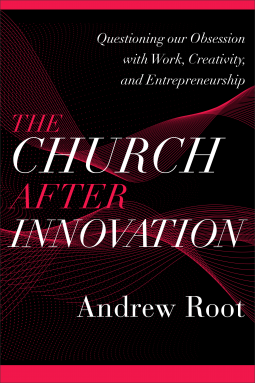
The Church after Innovation
Questioning Our Obsession with Work, Creativity, and Entrepreneurship
by Andrew Root
This title was previously available on NetGalley and is now archived.
Send NetGalley books directly to your Kindle or Kindle app
1
To read on a Kindle or Kindle app, please add kindle@netgalley.com as an approved email address to receive files in your Amazon account. Click here for step-by-step instructions.
2
Also find your Kindle email address within your Amazon account, and enter it here.
Pub Date Sep 20 2022 | Archive Date Nov 20 2022
Baker Academic & Brazos Press | Baker Academic
Talking about this book? Use #TheChurchafterInnovation #NetGalley. More hashtag tips!
Description
Named One of Fifteen Important Theology Books of 2022, Englewood Review of Books
Churches and their leaders have innovation fever. Innovation seems exciting--a way to enliven tired institutions, embrace creativity, and be proactive--and is a superstar of the business world. But this focus on innovation may be caused by an obsession with contemporary relevance, creativity, and entrepreneurship that inflates the self, lacks theological depth, and promises burnout.
In this follow-up to Churches and the Crisis of Decline, leading practical theologian Andrew Root delves into the problems of innovation. He explores where innovation and entrepreneurship came from, shows how they break into church circles, and counters the "new imaginations" like neoliberalism and technology that hold the church captive to modernity. Root reveals the moral visions of the self that innovation and entrepreneurship deliver--they are dependent on workers (and consumers) being obsessed with their selves, which leads to significant faith-formation issues. This focus on innovation also causes us to think we need to be singularly unique instead of made alive in Christ. Root offers a return to mysticism and the poetry of Meister Eckhart as a healthier spiritual alternative.
This is the fifth book in Root's Ministry in a Secular Age series.
Advance Praise
“This book will help you to consider the possible costs of chasing innovation and entrepreneurship—for you and your church. By tracing their origins, Andrew Root invites readers to examine the ends and aims of both innovation and entrepreneurship. Rather than helping the church and its congregants to thrive, unreflective practices of innovation and entrepreneurship can shift values and loyalties, and along the way contribute to anxiety, depression, and an overinflation of the self which works against genuine formation of the self in Christ. The Church after Innovation provides significant insights and questions regarding some of the most pressing challenges of our time.”—Angela Williams Gorrell, assistant professor of practical theology, Truett Theological Seminary, Baylor University
“There’s something satisfying about a story that is this big, bold, and revealing about how our cultural presumptions came to be—especially when so beautifully told. Root’s grand narrative offers the significant benefit of showing in fine-grain detail why Christians who do not account for the shaping effects of our economic practices evacuate the content of the Christian confession. When Christians fall in love with ideas of leadership, innovation, and entrepreneurship, we can be sure they have ignored for too long the secular economic context in which they live and breathe. A timely wake-up call.”—Brian Brock, professor of moral and practical theology, School of Divinity, History, and Philosophy, University of Aberdeen
“This perceptive and engaging book is a godsend for leaders and pastors seeking to cultivate the life of the church in a contemporary Western context. In a market saturated with quick-fix, innovate-or-die polemics on church growth, Root weaves a more nuanced philosophical and cultural critique of the captivity of innovation in capitalist culture with the theological insights to liberate the creativity we actually need. The tongue-in-cheek real-life stories of people like us struggling with this task humorously but effectively emphasize the real-world need for such a view of innovation and change. This book offers a richer path to help realize a transcendent creativity of epiphany (over innovation) that values people, nurtures personhood, and promotes flourishing for the church in a secular age.”—Nick Shepherd, FRSA, senior vision and strategy consultant, Archbishops’ Council of the Church of England
“With penetrating analysis and prophetic force, Andrew Root exposes how the false idols of capitalism are being smuggled into the church through the Trojan horses of innovation and entrepreneurialism. Fashionable trends touting church ‘growth’ are fueling self-absorption and drawing us away from the cross of Christ. This is a bold, necessary, and urgent book.”—Richard Beck, professor of psychology, Abilene Christian University; author of Hunting Magic Eels: Recovering an Enchanted Faith in a Skeptical Age
“Have you ever read a book and thought, ‘This is on point and I wish I wrote it’? That’s what happened to me when I finished The Church after Innovation. Ministers hear so many leadership mantras today: Innovate! Be efficient! Get creative! Time to pivot! Find your voice! Be authentic! In this book, Root reveals these mantras and the engine that generates them to be the problem. They are not the jewelry but the chains that keep the church captive to a soul-sucking culture. Seminaries need to assign this book. Ministers need to read this book. I’m grateful to Root for so powerfully articulating the biggest problem facing the church—namely, our supposed need to innovate.”—Tripp Fuller, founder and host of the Homebrewed Christianity podcast
“Peppered with real-life examples, Andrew Root’s The Church after Innovation opens up innumerable pathways of faithful thought and action for our exhausting times. Root is especially adept at exposing and probing the cultural contradictions of neoliberal capitalism, exploring how they have shaped (and warped) the mission of the church and our very selves. Come for that critique and stay for fascinating dives into management theory, the promise of nothingness, the mystics behind Martin Luther, and so much more. This important book is worthy of reading and rereading.”—Rodney Clapp, author of Naming Neoliberalism: Exposing the Spirit of Our Age
Available Editions
| EDITION | Other Format |
| ISBN | 9781540964823 |
| PRICE | $27.99 (USD) |
| PAGES | 256 |
Featured Reviews
Andrew Root's Church after Innovation is an interesting and incredibly in-depth discussion of the causes and possible effects of a church that is increasingly focused on innovation and entrepreneurship. This theological work is born of various conversations Root had where he heard people both hailing innovation as the Church's savior and those who viewed innovation as the millstone around the neck of the Church.
It's important to note that this book is very in-depth. Root traces the question of innovation and how it became rooted in Church-thought to its earliest traces and is incredibly deft in citing both theologians, economists, philosophers, etc. While this might disappoint those readers who are only looking for how to respond to the Church's new innovative streak, Root makes clear how each of these seemingly disparate threads are vital in understanding how we got to where we are and what the possible consequences (good and bad) might be if the church continutes to weave entrepreneurship and innovativeness into it's DNA. Root makes this whole process look easy which I think says something very important about how good of a theological writer he is. He also skillfully weaves anecdotes and practical experience into this book in a way that doesn't devalue his academic work but instead bolsters it (which as someone who has read a lot of theological writing is a rare feat).
 Conrade Y, Reviewer
Conrade Y, Reviewer
Each year, Apple enthusiasts celebrate the latest new iPhone. Software gets upgraded with more features that are better, faster, and more powerful than the previous generation. The old gets replaced by the new. It is a modern phenomenon that many of us are used to. Just like the Olympics where the prize goes to the fastest, tallest, or most able achievements, life, in general, seems to be heading toward the modern belief that the "latest and the greatest" are deemed better than the previous generation. CS Lewis once calls it "Chronological snobbery." In this book, author Andrew Root looks at how such a philosophy has engulfed the Church at large. He probes the nature of innovation and entrepreneurship asking questions about the history, the underlying philosophies, and its influence on the Church. The basic question in this book is: "Is the Church influencing the world more than the world of innovation influencing the Church?" He points to the latter and calls the modern Church having an "ecclesial obsession" with all things innovation. Thus the title of this book looks at what would happen if the church uncritically embraced innovation in all of its ministries. The author engages a host of philosophical thoughts from Meister Eckhart, John Tauler, Theologia Germanica, Michel Foucault, Andreas Reckwitz, Friedrich Hölderlin, and others. Root raises the question of how similar the Church is with companies like Applebees's where innovation is crucial to survival. While it is one thing to hear from just one Church, it is yet another to notice how pervasive that philosophy is. He notes how one Church tried innovation with great success in the first year only to fizzle out the year after. His key assertion is that the Church should not confuse ministry innovation with her real mission.
He unpacks his thesis in the rest of the book by probing the roots of the uncritical use of innovation and individuality. For instance, modern infatuation with innovation hardly has any orientation toward things divine. He acknowledges the way creativity and innovation have helped move society forward. Yet, while creativity does has benefits in ministry, it should not become an identity in itself. From consumerism to capitalism, management to growth via neoliberalism, it is easy for people to embrace creativity and innovation as the new solutions to all things, including Church.
My Thoughts
==============
This book is high in critique but comparatively low when it comes to solutions. Root makes powerful observations about the state of the Church and how it has unwittingly hopped onto the innovation bandwagon, sometimes too uncritically. Like many academics, he too is high on deconstruction but relatively low on reconstruction. To be fair, the author has already made it clear at the onset that his thesis is but a starting point for further conversations. He makes strong arguments against our infatuation with all things based on individual creativity and nonstop innovation. This is especially so when it comes to things pertaining to the mission of the Church. He critiques the spirit of the "innovate or die" paradigm that is fast becoming a distraction. Worse, it sucks away the humanity in us. I find Root's thesis a timely reminder of Romans 12:1-2, to be careful not to let the philosophies of the world squeeze the church into its mold.
Some people might find Root's critiques of capitalism and entrepreneurship a little too drastic. This might be applicable to those already deep in the innovation cloud or those who had experienced some level of success from innovation philosophies. So, for these groups, it might take a little while to see the validity behind Root's observations. Bear in mind that he often qualifies his observations in terms of "assumptions." He is not saying that the Church should abandon innovation and creative entrepreneurship altogether. What he is actually saying is two-fold: 1) Don't be distracted by the innovation emphasis to the detriment of the true mission of the Church; 2) Refocus Christian Ministry based on the Theology of the Cross. Then our ministry will grow more toward authenticity instead of mere aesthetics.
A word about Root's conclusion. Using Friedrich Hölderlin's movement from Enlightenment to Romanticism, we are reminded that the highest goal of the human person is toward fulfillment in God rather than self-accomplishment. This might appear strange judging from Root's many analytical chapters throughout the book, only to arrive at such a conclusion about art and poetry. I remember one apologist saying how arguments can work both ways. If one could reason oneself into faith, in the same way, one could also reason oneself out of faith. Thus shows the limits of analysis. I believe Root has a point here, that the divine cannot be approached by the mind of analysis. God needs to be embraced in worship and that in itself is an art.
As always, I find Root's work very thought provoking. This book is no different.
Andrew Root (PhD, Princeton Theological Seminary) is Carrie Olson Baalson Professor of Youth and Family Ministry at Luther Seminary in St. Paul, Minnesota. He is the author of numerous books, including Faith Formation in a Secular Age, The Pastor in a Secular Age, The Congregation in a Secular Age, Churches and the Crisis of Decline, and The End of Youth Ministry? Root is also the coauthor (with Kenda Creasy Dean) of The Theological Turn in Youth Ministry.
Rating: 4.25 stars of 5.
conrade
This book has been provided courtesy of Baker Academic and NetGalley without requiring a positive review. All opinions offered above are mine unless otherwise stated or implied.
Part of the author's series regarding how Christianity can look and work in our secular age; in this work he focuses on the emphasis on "innovation" and "entrepreneurship."
Throughout the book the author explains his connections in a denominational organization with various characters, all of whom want to move forward in ministry and be effective, but with varying commitments to "innovation." One guy is reactionary against such things; one seems to be a potent evangelist for it; another is a higher level official who is trying to leverage the spirit of the age to advance the mission.
Yet the author throughout has his misgivings about the entire impetus toward "innovation." He does so not from a Luddite or reactionary posture but instead considers the recent history of how we have reached the place where creativity, entrepreneurship, and innovation are prized above all other things. Part of this story is the greater insecurity but "freedom" granted ever since the collapse of the bureaucratized workplace of the 1940s to the 1970s; a lot of the story is how capitalism manifests all kinds of internal contradictions regarding consumption and creativity and thus questions using what works for business as a model for what should work for Christians and churches. He speaks of the exhaustion brought by the constant pursuit of continual innovation, the over-valuation of the self when creativity is honored above all, and how attempting to foster creativity and innovation can many times backfire.
The story does not turn out as expected; the innovation evangelist leaves ministry; a dynamic small group looking to creatively innovate implodes and hinders the faith development of many of the young people working in it. The author looks toward the path of the mystics to help us find a way beyond innovation and creativity and the boxes they force us into in late capitalism.
A lot to chew on. Good critique of the continual attempts to use business insights to direct the way forward for Christians and churches. Definitely worth consideration.












